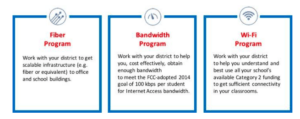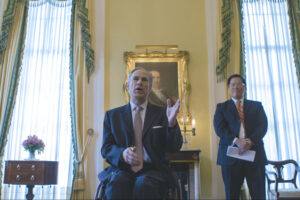Since 1998, the E-rate program has provided subsidies to schools across the nation to support the cost of telecommunications and Internet services. At the core of this universal service funding program is the belief that all students in all locations throughout the country deserve equal educational opportunities and the ability to study, work, and thrive in our increasingly digital world. For 20 years, E-rate has made that belief an attainable, affordable goal for school districts across Texas.

“E-rate plays a huge part in our budgeting for technology. It’s a critical program that allows us to be aggressive in our planning knowing that at least for bandwidth we’re going to be reimbursed. It makes our budgeting possible, and we know that as bandwidth needs grow it’s going to be economically sustainable. We may invest more money upfront into our bandwidth, but knowing that the end user experience is boundless and allows them to do much more is worth it – we’re putting [the user] first.” – Chris Cummings, Director of Information Technology, Klein Independent School District
The Classroom Connectivity Initiative, a partnership between the Office of Governor Greg Abbott, the Texas Education Agency (TEA), and national non-profit EducationSuperHighway, recognizes that access to high-speed Internet is non-negotiable for student success. It addresses three key components: fiber, bandwidth, and WiFi.

In addition to those components, the initiative is tackling connectivity challenges in Texas by helping districts access state matching funds. Designed to support schools with the cost of getting scalable infrastructure to their front door, these funds could help solve a major issue schools face in connecting to high-speed Internet. This is all possible because the Second E-rate Modernization Order stated that if a state created a fund to support schools with the cost of special construction, the E-rate program would contribute an additional 10%, on top of a school’s calculated discount to match the state’s contribution.
Here’s an example of how a school district may take advantage of the state matching fund:
- School district applies for 80% E-rate discount.
- Texas state matching fund contributes 10%.
- E-rate state matching provision contributes additional 10%.
- 100% of special construction costs are covered for the school district.
 School districts across the state can benefit from the funding, and a majority of those eligible are in rural areas. We’re continuing to work with schools to make sure they understand how to use the funding to improve Internet access for their students.
School districts across the state can benefit from the funding, and a majority of those eligible are in rural areas. We’re continuing to work with schools to make sure they understand how to use the funding to improve Internet access for their students.
Here’s what we are hearing so far:
“Fast Internet speeds are a crucial part of delivering high-quality digital learning to our classrooms, and scalable fiber optic-based Internet connectivity has been an elusive goal for some time now in our district. With the added construction cost of being a rural district, we would always struggle to move forward. While we are still in the middle of the approval process, the availability of the Texas state matching funds this year gave us the momentum to begin the E-rate and state match application process to ensure we provide the best opportunity for our students for years to come.” – Billy Polasek, Technology Director, Stockdale Independent School District
The state match is only available for E-rate funding years 2017 and 2018. The Form 471 Filing deadline is March 22, so it’s important to get started by visiting TEA’s Classroom Connectivity Initiative website.
As the end of the E-rate cycle approaches, additional tools are available for school districts that already have scalable infrastructure. School leaders can find their district on Compare & Connect K-12, EducationSuperHighway’s free tool designed to compare broadband speeds and pricing to neighboring districts to power negotiations this year. More details on eligibility can be found on the Classroom Connectivity State Match FAQ. For questions, email classroomconnectivity@tea.texas.gov.
Guest authors: Kai Addy and Alyssa Cubello, EducationSuperHighway
Photo Credit: iPhone and Backpack by Josh Felise on Unsplash; Photo of Governor Abbott taken by ESH.

